形容词、副词的基本用法
形容词与副词
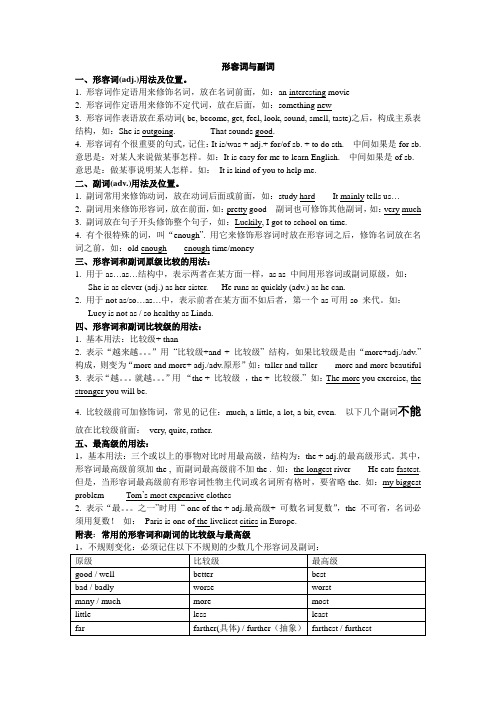
形容词与副词一、形容词(adj.)用法及位置。
1. 形容词作定语用来修饰名词,放在名词前面,如:an interesting movie2. 形容词作定语用来修饰不定代词,放在后面,如:something new3. 形容词作表语放在系动词( be, become, get, feel, look, sound, smell, taste)之后,构成主系表结构,如:She is outgoing. That sounds good.4. 形容词有个很重要的句式,记住:It is/was + adj.+ for/of sb. + to do sth. 中间如果是for sb. 意思是:对某人来说做某事怎样。
如:It is easy for me to learn English. 中间如果是of sb. 意思是:做某事说明某人怎样。
如:It is kind of you to help me.二、副词(adv.)用法及位置。
1. 副词常用来修饰动词,放在动词后面或前面,如:study hard It mainly tells us…2. 副词用来修饰形容词,放在前面,如:pretty good 副词也可修饰其他副词,如:very much3. 副词放在句子开头修饰整个句子,如:Luckily, I got to school on time.4. 有个很特殊的词,叫“enough”. 用它来修饰形容词时放在形容词之后,修饰名词放在名词之前,如:old enough enough time/money三、形容词和副词原级比较的用法:1. 用于as…as…结构中,表示两者在某方面一样,as as 中间用形容词或副词原级,如:She is as clever (adj.) as her sister. He runs as quickly (adv.) as he can.2. 用于not as/so…as…中,表示前者在某方面不如后者,第一个as可用so 来代。
(完整版)副词与形容词的用法

副词和形容词一、形容词的用法1.形容词修饰名词,并且放在名词的前面,这时形容词在句子中作定语例如: a beautiful lady、a tall man、a big houseA beautiful lady is standing in front of a tall man.2.形容词放在be动词的后面,这时形容词在句子中作表语/主语补足语。
例如:The lady is tall. (tall在句子中作表语,说明lady是怎么样的)The beautiful lady is tall. (beautiful在句子中作定语,tall作表语)The beautiful lady is tall and slim.3.形容词放在连系动词(become成为、seem看起来、taste尝起来、look看起来、smell闻起来、feel摸起来/感觉、turn变成,等等)后面,在句子中作表语/主语补足语。
例如:The leaf (叶子) turned yellow.树叶变黄了。
She looks beautiful./ He looks handsome. 她看起来漂亮。
/他看来帅气。
The food taste good. 这些食物好吃。
The sweater feels soft. (柔软的;舒服的)He becomes careful. (小心的) 他变得小心了。
The flower smells very good. 花闻起来很香。
Everything seems good. 一切看起来都好。
二、副词的用法1.副词修饰动词,并且通常放在实义动词后面,这是副词在句子中作方式状语。
例如:The man runs fast. (fast修饰runs这个动作)She jumps high. (high修饰jump这个动作)He finished his homework quickly. (quickly修饰finished这个动作)2.副词修饰形容词,并且通常放在形容词的前面例如:He becomes very handsome.She looks very beautiful.The lady is very tall and slim.在“副词+形容词”这样的结构中,中心词是形容词,副词只是为了说明程度大小即:very handsome的中心词是handsome3.副词前面也可以加副词,例如上面的句子都可以改写成:The man runs very fast.She jumps very high.He finished his homework very quickly.very本身是副词,意思是“非常,很”,所以后面也可以跟副词或者形容词。
英语形容词与副词用法

英语形容词与副词用法在英语中,形容词和副词是两类重要的词性,它们用于修饰名词或者动词以提供更多的描述信息。
掌握正确的形容词和副词用法对于语言学习者来说至关重要。
本文将详细介绍英语形容词和副词的用法。
一、形容词的用法形容词通常用于修饰名词,使其更具描述性。
以下是一些形容词的常见用法:1. 形容词作为表语形容词可以作为表语,用于描述主语的特征或状态。
如:- The book is interesting.(这本书很有趣。
)- She is beautiful.(她很漂亮。
)2. 形容词作为定语形容词可以作为定语,修饰名词。
如:- I bought a red dress.(我买了一条红色裙子。
)- He is a talented musician.(他是一位有才华的音乐家。
)3. 形容词作为宾语补足语形容词可以作为宾语补足语,后接感官动词(如see, hear, smell等)或使役动词(如make, let, have等)。
如:- I found the movie boring.(我发现这部电影很无聊。
)- She made me happy.(她让我开心。
)4. 形容词作为表语补足语形容词可以作为表语补足语,用于补充说明主语的特征或状态。
如:- She felt happy.(她感到快乐。
)- He seems tired.(他看起来很累。
)二、副词的用法副词通常用于修饰动词、形容词、副词或整个句子,以提供更多的程度、方式、时间等信息。
以下是一些副词的常见用法:1. 副词修饰动词副词可以修饰动词,表示动作发生的方式、程度或频率。
如:- They quickly ran to catch the bus.(他们迅速地跑着去赶公交车。
)- She rarely goes to the cinema.(她很少去电影院。
)2. 副词修饰形容词或副词副词可以修饰形容词或副词,表示程度或方式。
如:- He is extremely intelligent.(他非常聪明。
形容词和副词的用法

形容词和副词的用法 It was last revised on January 2, 2021形容词和副词的用法作用:1.形容词:(1)形容词在句中常修饰名词和代词。
A good boy. Something important(2)形容词在句中作定语、表语、宾语补足语。
Our country is a beautiful country. (作定语)The meal is delicious. (作表语)We keep our classroom clean and tidy. (作宾语补足语)2.副词:(1)副词在句中修饰动词、副词、形容词、全句(Luckily)。
She speaks English well. Luckily, I passed the exam.(2)副词在句中可作状语、表语、和定语。
He studies very hard. (作状语) When will you be back.(作表语)注意:常用来修饰原级的词有:very,too, so, really, quite, pretty等一、位置1.形容词:通常要放在所修饰的名词之前,但要放在不定代词(something、anything…)之后。
2.副词:1)多数副词作状语时放在行为动词之后。
如果动词带宾语,则放在宾语之后。
Mr. Smith works very hard. She speaks English well.2) 频度副词作状语时,通常放在行为动词之前,情态动词、be动词和助动词之后。
He usually gets up early. I am never late for school.3) 程度副词一般放在所修饰的名词前面。
He runs very fast.形容词和副词的比较级和最高级。
大多数形容词和副词有三个等级:原级、比较级、最高级。
原级指形容词和副词的原形;比较级用来表示“较……”或“更……一些”;最高级则表示“最……”一、形容词和副词的原级:1.表示两者(A与B)在某一方面相同时用句型:A + 谓语 + as + 形容词或副词的原形 + as+ B.eg: ① Tom 和 Sam 一样高。
形容词副词的用法归纳总结

形容词副词的用法归纳总结形容词和副词是英语中非常重要的词性,它们在句子中起到修饰和描述的作用。
以下是形容词和副词的用法归纳总结:一、形容词的用法1. 作定语:形容词通常用于修饰名词或代词,位于所修饰的名词或代词之前。
例如:a beautiful flower,the smart boy。
2. 作表语:形容词可以用于系动词之后,构成“主系表”结构,描述主语的特征或状态。
例如:She is beautiful. The food tastes good.3. 作宾语补足语:形容词可以用于某些动词的宾语之后,补充说明宾语的特征或状态。
例如:We made the room clean. Please keep the door open.4. 比较级和最高级:形容词可以通过比较级和最高级的形式来进行比较。
比较级用于两者之间的比较,最高级用于三者或以上的比较。
例如:bigger,the biggest。
二、副词的用法1. 修饰动词:副词通常用于修饰动词,描述动作的方式、程度、时间等。
例如:She sings beautifully. He runs fast.2. 修饰形容词:副词也可以用于修饰形容词,增强形容词的描述效果。
例如:very beautiful,extremely smart。
3. 修饰其他副词:副词还可以用于修饰其他副词,进一步说明其程度或方式。
例如:He speaks very loudly.4. 时间和地点副词:副词可以表示时间和地点,如:now,yesterday,here,there。
5. 疑问副词和连接副词:疑问副词用于疑问句中,如:when,where,how;连接副词用于连接句子或从句,如:therefore,however。
需要注意的是,形容词和副词的用法比较灵活,具体使用要根据句子的结构和上下文来决定。
同时,也要注意形容词和副词的比较级和最高级的构成规则以及使用方法。
希望这些总结对你有所帮助。
形容词和副词的基本用法

形容词和副词的基本用法形容词和副词是英语中最常用的两种词性,它们在句子中扮演着非常重要的角色。
形容词和副词的基本用法包括:修饰名词和代词、修饰动词、修饰其他形容词和副词、修饰整个句子等。
下面我们将详细介绍这些用法。
一、修饰名词和代词形容词和副词最基本的用法就是修饰名词和代词。
形容词通常放在名词前面,用来描述名词的特征和性质,例如:1. a beautiful flower(一朵美丽的花)2. a tall building(一座高大的建筑)3. an interesting book(一本有趣的书)副词通常放在动词后面,用来描述动作的方式、时间、地点等,例如:1. She speaks English fluently.(她讲英语流利。
)2. He runs fast.(他跑得快。
)3. They live nearby.(他们住在附近。
)二、修饰动词形容词和副词还可以用来修饰动词,表示动作的性质、方式、程度等。
在这种情况下,形容词通常放在be动词后面,副词则放在动词后面,例如:1. The weather is cold.(天气很冷。
)2. She sings beautifully.(她唱得很美。
)3. He speaks English fluently.(他讲英语很流利。
)三、修饰其他形容词和副词形容词和副词还可以用来修饰其他形容词和副词,表示它们的程度、强度等。
在这种情况下,通常使用副词来修饰形容词或副词,例如:1. The movie was very interesting.(这部电影非常有趣。
)2. She sings extremely well.(她唱得极好。
)3. He speaks English quite fluently.(他讲英语相当流利。
)四、修饰整个句子形容词和副词还可以用来修饰整个句子,表示说话人对整个情况的看法、态度等。
在这种情况下,通常使用副词来修饰整个句子,例如:1. Fortunately, the weather is good today.(幸运的是,今天天气很好。
知识点形容词与副词总结
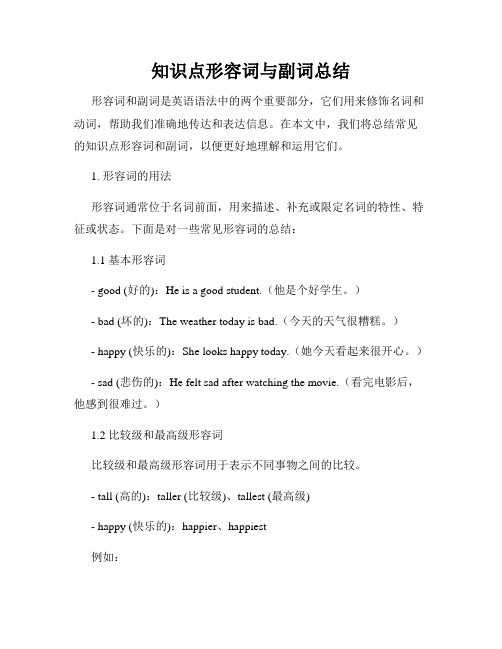
知识点形容词与副词总结形容词和副词是英语语法中的两个重要部分,它们用来修饰名词和动词,帮助我们准确地传达和表达信息。
在本文中,我们将总结常见的知识点形容词和副词,以便更好地理解和运用它们。
1. 形容词的用法形容词通常位于名词前面,用来描述、补充或限定名词的特性、特征或状态。
下面是对一些常见形容词的总结:1.1 基本形容词- good (好的):He is a good student.(他是个好学生。
)- bad (坏的):The weather today is bad.(今天的天气很糟糕。
)- happy (快乐的):She looks happy today.(她今天看起来很开心。
)- sad (悲伤的):He felt sad after watching the movie.(看完电影后,他感到很难过。
)1.2 比较级和最高级形容词比较级和最高级形容词用于表示不同事物之间的比较。
- tall (高的):taller (比较级)、tallest (最高级)- happy (快乐的):happier、happiest例如:- He is taller than his brother.(他比他的兄弟高。
)- She is the happiest person in the room.(她是房间里最快乐的人。
)1.3 泛指和特指形容词泛指形容词用于描述没有具体限制的事物,而特指形容词用于描述特定的事物。
- some (一些):He bought some apples.(他买了一些苹果。
)- this (这个):This book is interesting.(这本书很有趣。
)2. 副词的用法副词通常用来修饰动词、形容词或者其他副词,用来表达方式、时间、原因等。
2.1 副词修饰动词- slowly (慢慢地):He walks slowly.(他走得很慢。
)- quickly (快速地):She runs quickly.(她跑得很快。
形容词与副词的用法

形容词与副词的用法形容词和副词是英语中常用的两类词性,它们在句子中分别修饰名词和动词,起到描述事物性质和方式的作用。
正确使用形容词和副词能够使语言更加生动、精确,让表达更加丰富。
下面将详细介绍形容词和副词的用法。
一、形容词的用法形容词用来描述名词或代词,表达它们的性质、状态或特征。
通常形容词在句子中位于名词的前面,用来修饰名词。
1. 形容词的基本用法形容词可以直接修饰名词,起到描述性质或特征的作用。
例如:- A beautiful flower (一个美丽的花)- The tall man (那个高个子男人)形容词也可以用在系动词后面,与主语共同构成系表结构,表示主语的状态或性质。
例如:- The girl is happy. (这个女孩很开心)- He seems tired. (他似乎很累)2. 形容词的比较级和最高级形容词有比较级和最高级两种形式,用来表示事物之间的大小、程度、高低等差异。
一般情况下,单音节形容词在词尾加上-er构成比较级,加上-est构成最高级。
例如:- big - bigger - biggest (大 - 更大 - 最大)- small - smaller - smallest (小 - 更小 - 最小)对于多音节或部分双音节形容词,可在前面加上more或most来构成比较级和最高级。
例如:- intelligent - more intelligent - most intelligent (聪明 - 更聪明 - 最聪明) - beautiful - more beautiful - most beautiful (美丽 - 更美丽 - 最美丽)3. 形容词的修饰顺序当有多个形容词修饰同一个名词时,它们的顺序通常遵循以下规则:限定词 - 描绘性形容词 - 尺寸形容词 - 年龄形容词 - 形状形容词 - 颜色形容词 - 国籍形容词 - 材料形容词 - 用途形容词例如:- A beautiful tall young woman (一个美丽的高个年轻女人)- An old round wooden table (一张古老的圆木桌子)- Three small red Chinese silk dresses (三件小号红色中国丝绸连衣裙)二、副词的用法副词用来修饰动词、形容词、副词、句子以及表示时间、地点和方式等。
形容词、副词用法归纳
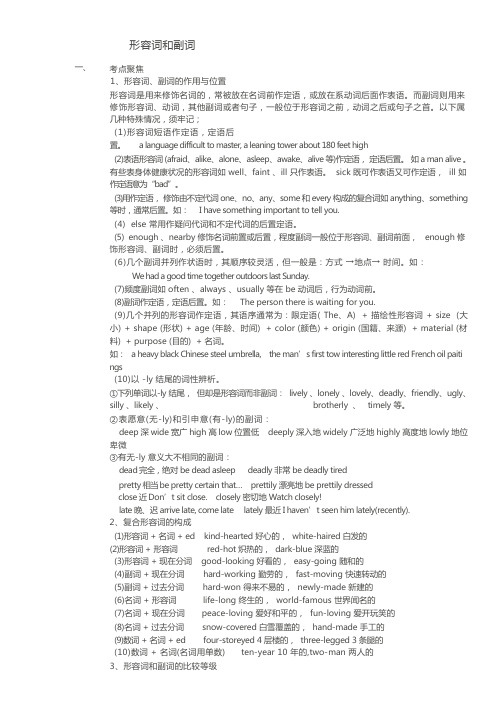
形容词和副词一、考点聚焦1、形容词、副词的作用与位置形容词是用来修饰名词的,常被放在名词前作定语,或放在系动词后面作表语。
而副词则用来修饰形容词、动词,其他副词或者句子,一般位于形容词之前,动词之后或句子之首。
以下属几种特殊情况,须牢记;(1)形容词短语作定语,定语后置。
a language difficult to master, a leaning tower about 180 feet high(2)表语形容词 (afraid、alike、alone、asleep、awake、alive 等)作定语,定语后置。
如 a man alive 。
有些表身体健康状况的形容词如 well、faint 、ill 只作表语。
sick 既可作表语又可作定语, ill 如作定语意为“bad”。
(3)用作定语,修饰由不定代词 one、no、any、some 和 every 构成的复合词如 anything、something等时,通常后置。
如: I have something important to tell you.(4) else 常用作疑问代词和不定代词的后置定语。
(5) enough 、nearby 修饰名词前置或后置,程度副词一般位于形容词、副词前面, enough 修饰形容词、副词时,必须后置。
(6)几个副词并列作状语时,其顺序较灵活,但一般是:方式→地点→ 时间。
如:We had a good time together outdoors last Sunday.(7)频度副词如 often 、always 、usually 等在 be 动词后,行为动词前。
(8)副词作定语,定语后置。
如: The person there is waiting for you.(9)几个并列的形容词作定语,其语序通常为:限定语( The、A) + 描绘性形容词 + size (大小) + shape (形状) + age (年龄、时间) + color (颜色) + origin (国籍、来源) + material (材料) + purpose (目的) + 名词。
英语中形容词和副词的用法

英语中形容词和副词的用法一、形容词形容词主要用来说明或修饰名词或代词,增加或补充其含义,从而限制或缩小其适用的范围。
表示人或事物的性质、状态和特征。
形容词可在句中充当定语修饰名词、代词,也可作表语表示主语的状态、特征,也可作补语、状语。
作定语:He is a very good swimmer.作表语:He looks very healthy.作宾语补足语:The rain made the ground wet.作主语补足语:She was considered smart.作主语或宾语:The old are respected here and there.The new replaces the old.作状语:Tired and hot, we had to stop to have a break.二、副词副词主要修饰动词、形容词或其他副词,有时也可用来修饰全句。
说明时间、地点、方式、程度等概念。
作状语:It's raining heavily.修饰形容词:It's rather a difficult job.修饰介词短语:The arrow hit the apple right in the middle.修饰从句:This is exactly what she said.修饰名词、代词及数词:Life here is full of joy.She is going to extend her stay there for about two weeks. Nearly everybody came to party.作表语:The class is over.作介词宾语:Who is calling me from downstairs?作定语:Are you content with the life here?作补语:We were shown by the young man.。
副词与形容词的用法
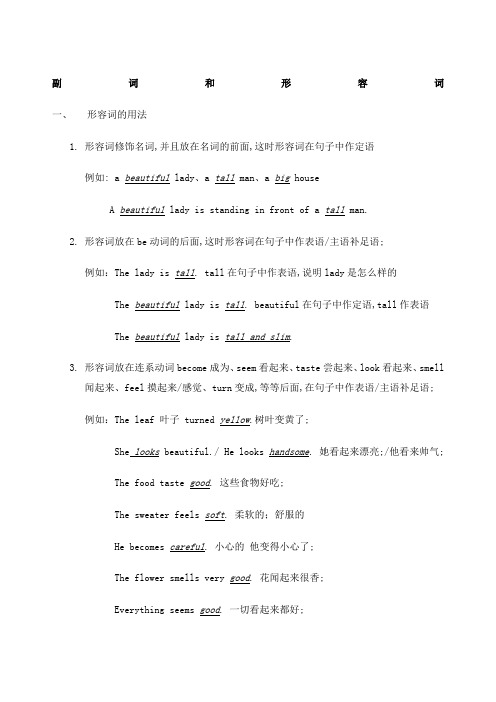
副词和形容词一、形容词的用法1.形容词修饰名词,并且放在名词的前面,这时形容词在句子中作定语例如: a beautiful lady、a tall man、a big houseA beautiful lady is standing in front of a tall man.2.形容词放在be动词的后面,这时形容词在句子中作表语/主语补足语;例如:The lady is tall. tall在句子中作表语,说明lady是怎么样的The beautiful lady is tall. beautiful在句子中作定语,tall作表语The beautiful lady is tall and slim.3.形容词放在连系动词become成为、seem看起来、taste尝起来、look看起来、smell闻起来、feel摸起来/感觉、turn变成,等等后面,在句子中作表语/主语补足语;例如:The leaf 叶子 turned yellow.树叶变黄了;She looks beautiful./ He looks handsome. 她看起来漂亮;/他看来帅气;The food taste good. 这些食物好吃;The sweater feels soft. 柔软的;舒服的He becomes careful. 小心的他变得小心了;The flower smells very good. 花闻起来很香;Everything seems good. 一切看起来都好;二、副词的用法1.副词修饰动词,并且通常放在实义动词后面,这是副词在句子中作方式状语;例如:The man runs fast. fast修饰runs这个动作She jumps high. high修饰jump这个动作He finished his homework quickly. quickly修饰finished这个动作2.副词修饰形容词,并且通常放在形容词的前面例如:He becomes very handsome.She looks very beautiful.The lady is very tall and slim.在“副词+形容词”这样的结构中,中心词是形容词,副词只是为了说明程度大小即:very handsome的中心词是handsome3.副词前面也可以加副词,例如上面的句子都可以改写成:The man runs very fast.She jumps very high.He finished his homework very quickly.very本身是副词,意思是“非常,很”,所以后面也可以跟副词或者形容词;三、填形容词还是副词动词后面一般都跟副词,但不是所有动词后面都跟副词,实义动词后面跟副词,连系动词后面跟形容词;例如:She sings beautifully. sing是实义动词,beautiful用来说明唱得如何Tom draws well.draw是实义动词,well用来说明画得如何My teacher is young and tall.is是系动词,后面跟形容词She looks sad. look是连系动词,后面跟形容词还有一些不是连系动词的词,例如make和get,要根据句子的意思判断填形容词还是副词;区分:He is making a kite carefully.carefully用来修饰make这个动词He made the teacher angry.angry是指the teacher,而不是修饰make这个动词The student got quiet when the teacher came in.quiet是指the student,而不是修饰got这个动词I get up early.early修饰动词get upShe leaves the room quickly.quickly修饰leave这个动词Please leave the door open.open是指the door,而不是修饰leave这个动词于是有词组:make sb+adj. leave sb+adj. get+adj因此,填形容词还是副词,首先要弄清楚句子的意思,判断所修饰的成分是名词/代词还是动词,修饰前者的用形容词,修饰后者的用副词;四、形容词和副词分别长什么样子1.形容词的词尾通常有ing/ful/ed/yinteresting、tiring、boring、exciting、surprising、amazing与物有关interested、tired、bored、excited、surprised、amazed与人有关careful、hopeful、wonderful、helpful、colorful、meaningful、beautifulrainy、windy、cloudy、dry、messy、easy、funny、busy、angry区分:The children were excited when they heard the exciting news.The man was tired劳累的 after doing so many tiring累人的 jobs.但是在interesting与interested中,形容人或物的都用interesting,而interested 常以词组be interested in的形式出现,表示“对…感兴趣”;The story is interesting./The teacher is interesting.I am interested in reading.2.副词的词尾通常是ly,但亦有一些不以ly结尾的副词;badly、surprisingly、carefully、hopefully、quickly、greatly、possibly通常是由形容词加ly变来hard努力地、well好、high高、fast快地、pretty十分,非常、very much/a lot 非常a little一点3.有些词既是形容词也是副词hard adj.硬的 adv.努力地 early adj.早的 adv.早地high adj.&adv. 高well adj.健康地 adv.好I doesn’t feel well.我觉得不舒服;Well done.做得好late adj.迟的 adv.迟 be late for school 上学迟到五、形容词变副词的规律1. Look at the children on the playground. They are flying kites ________happy.do you think you did so ___________badin your testcan __________easy forgive a child who is afraid of the dark, but we can’t forgive an adult who is afraid of the light.Y ou’ve answered all the questions _________correct.computer is ______wideused in our daily life. We can do many things with it.8. I changed into my sports shoes so that I could walk more ____________comfortable.passed her examination because she studied very ________hard.10.“Why didn’t you tell me earlier” The boss shouted _______hungry.’s ___true possible that robot teachers will be popular in schools some day.13. How _________comfortable the giant pandas are living in TaiwanXu smiled and sa id to me ________soft, “Never mind, my boy”night it rained __________heavy in the southern part of the city.17. Simon hates to be like others, he often tires to do everything ______different.children clapped their hands _________excited as soon as the astronauts appearedon the stage.had an accident yesterday. His teacher sent him to the hospital ____quick. 21. We should speak to the old man _________polite’m _______true sorry I can’t go with you. I have a lot to do this afternoon. father was looking _________ angry at him because he had made a serious mistake.26. Mike walked _______quiet into the room not to wake up his grandpa.27. How _______quick Betty answered the teacher’s question28. The firemen have saved the boy from the fire ____________successful.29.She is an __________ teacher because she often tells ___________ stories everyday. interest30.The children were ___________ about the _____________ news. excite31.The woman looks ___________. beauty32.The teacher got ____________ anger because the boy didn’t finish his homeworkin time.33.The boy told his father ________________ excite, “I got a full mark in the exam”34.It is ___________ for the boy to finish such a task.difficulty35.The mother is __________ about her son’s safety.worry。
形容词和副词用法知识点总结
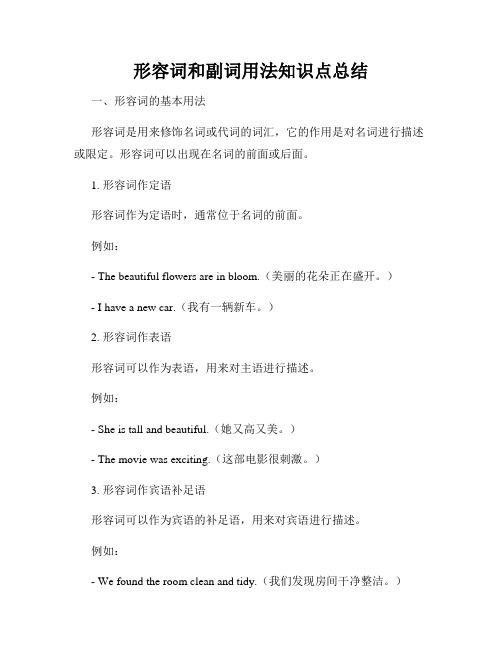
形容词和副词用法知识点总结一、形容词的基本用法形容词是用来修饰名词或代词的词汇,它的作用是对名词进行描述或限定。
形容词可以出现在名词的前面或后面。
1. 形容词作定语形容词作为定语时,通常位于名词的前面。
例如:- The beautiful flowers are in bloom.(美丽的花朵正在盛开。
)- I have a new car.(我有一辆新车。
)2. 形容词作表语形容词可以作为表语,用来对主语进行描述。
例如:- She is tall and beautiful.(她又高又美。
)- The movie was exciting.(这部电影很刺激。
)3. 形容词作宾语补足语形容词可以作为宾语的补足语,用来对宾语进行描述。
例如:- We found the room clean and tidy.(我们发现房间干净整洁。
)- He painted the wall red.(他把墙涂成了红色。
)二、副词的基本用法副词是用来修饰动词、形容词、副词或整个句子的词汇,它的作用是对动作、状态、程度等进行描述。
1. 副词修饰动词副词常常用来修饰动词,表示动作的方式、频率、时间等。
例如:- She speaks English fluently.(她流利地说英语。
)- He often goes swimming on weekends.(他经常在周末去游泳。
)2. 副词修饰形容词副词可以用来修饰形容词,表示程度或程度变化。
例如:- The weather is extremely hot today.(今天天气非常炎热。
)- She is quite tall for her age.(她相对于她的年龄来说很高。
)3. 副词修饰副词副词还可以用来修饰其他副词,表示程度、方式等。
例如:- He speaks English very fluently.(他非常流利地说英语。
)- She runs quite slowly.(她跑得相对较慢。
形容词和副词的基本用法和句型

形容词和副词的基本用法和句型形容词和副词是英语中用于描述名词、动词、形容词以及其他副词的词类。
它们在句子中起到修饰、描绘和强调的作用。
在本文中,将为你介绍形容词和副词的基本用法和句型。
一、形容词的基本用法形容词用于描述名词,使句子更加生动、形象。
形容词通常放在名词前面,用于修饰名词,起到补充定义的作用。
下面是一些形容词的基本用法:1. 形容词的比较级和最高级形容词可以使用比较级和最高级形式,以强调事物之间的差异。
比较级用于比较两个事物的程度,最高级则用于比较三个或更多事物之间的程度。
比较级的一般结构为“形容词+er+than”,最高级的一般结构为“the+形容词+est”。
例如:- My sister is taller than me.(我姐姐比我高。
)- He is the tallest person in the class.(他是班级里最高的人。
)2. 形容词的位置形容词通常放在名词前面,用于修饰名词。
然而,在某些情况下,形容词也可以放在名词后面,用于强调句子的主语。
例如:- The beautiful flowers bloomed in the garden.(美丽的花朵在花园中盛开。
)- It was a day warm and sunny.(那是一个温暖而阳光明媚的日子。
)二、副词的基本用法副词用于修饰动词、形容词和其他副词,描述动作或状态的方式、程度和频率。
下面是一些副词的基本用法:1. 副词描述动作的方式副词可以描述动作是如何进行或完成的,给予读者更多关于动作的信息。
例如:- He ran quickly.(他跑得很快。
)- She spoke softly.(她说话轻声细语。
)2. 副词描述动作的程度副词可以用于描述动词或形容词的程度,表达事物的程度高低。
例如:- The coffee is extremely hot.(咖啡非常热。
)- I am quite tired.(我很累了。
形容词副词的用法

形容词一、形容词的一般用法:形容词是指用来修饰、说明名词或不定代词;表示人或物的性质、特征和状态..一般放在它所修饰的名词前作定语;也可独立作表语或宾语补足语等..1.作定语;一般放在所修饰词的前面..It’s a cold and windy day.2.作表语;放在系动词的后面..look;feel;smell;sound….He looks happy today.3.形容词修饰something;anything;nothing;everything等复合不定代词时;须放在其后..Would you like something hot to drink4.表示长、宽、高、深及年龄的形容词;应放在相应的名词之后..How long is the river It’s about two hundred metres long.5.只能作表语的形容词:afraid;alone;asleep;awake;alive;well 健康的;ill;frightenedThe man is ill.正The ill man is my uncle.误6.只能作定语的形容词:little小的;only唯一的;wooden木质的;woolen 羊毛质的;elder年长的My elder brother is in Beijing.正My brother is elder. 误7.貌似副词的形容词:lonely;friendly;lively;lovely二、形容词常用句型1.“It’s +adj.+of+sb.+不定式”表示“某人做某事怎么样”..=Sb +be +adj+to do sth注意:这一句型中常用描述行为者的性格、品质的形容词;如good;kind;nice;polite ;clever ;foolish ;lazy ;careful;careless; right正确的;wrong等..It’s very kind of you to help me.=You are very kind to help me.2.“It’s+adj.+for+sb.+不定式”表示“做某事对某人来说怎么样”..=To do sth is adj for sb .注意:这一句型中常用的形容词有important;necessary;difficult;easy;hard;dangerous;safe;useful;p leasant;interesting;impossible等..It’s not easy for them to learn a foreign language.=To learn a foreign language is not easy for them.3.表示感情或情绪的形容词;如glad;pleased;sad;thankful等常接不定式..I’m very sad to hear the bad news.4.表示能力和意志的形容词;如ready乐意的;有准备的;able有能力的;sure一定;certain一定等常接不定式..Lei Feng is always ready to help others.He is sure to get to school on time.注意:a. 有些形容词只能作表语..如:alone; afraid; asleep等..如: That old man feels alone because his children are out. I'm afraid he can't come.b. 形容词与不定代词something; anything; nothing; everything等连用时;要放在这些词后面..如: There is something wrong with my DVD machine. It's nothing serious.c. 某些形容词可以和定冠词连用;表示一类人或事物;其作用相当于一个名词..如: the young年轻人;the poor穷人; the rich富人d. 如果有两个以上的形容词修饰同一个名词时;其前后排列顺序一般如下:限定词a/the; this/some/her……+数量词先序数词后基数词+观点+大小+形状+新旧+颜色+产地+材料+名词..如:a big old German computerⅡ副词一、副词的分类副词按词汇意义可分为:方式副词:well;fast;slowly;carefully;quickly程度副词:very;much;enough;almost;rather;quite地点副词:here;there;out;somewhere;abroad;home时间副词:today;early;soon;now;then;recently;still频度副词:always;often;usually;sometimes;seldom;never否定副词:no;not;neither;nor疑问副词:where;how;why其他:also;too;only二、副词的基本用法:副词是用来修饰动词、形容词、其他副词或整个句子;有时也能修饰名词;表示时间、地点、方式、程度、动作、频度等;在句中主要用作状语..i. 副词修饰动词;告诉我们动作是怎样进行的;什么时候进行或者在什么地方发生的;一般位于动词之后..如:They went to the park early yesterday. We must study hard. ii. 副词修饰形容词或副词;则告诉我们这些形容词或副词的程度如何;一般位于这些词前.. 如:Michael Jordan jumps very high.Dai Yuqiang sings quite well.注意:a.副词表示频度修饰动词时;位于连系动词和助动词之后;行为动词之前..如:Mr. Wang usually comes to school on foot. The boy is often ill.b. already和yet的区别:already用于陈述句;一般用于句中;但不能和时间状语放在一起;译为“已经”;yet用来谈某事在预料之中;用于疑问句时译为“已经”;但用在否定句中则译为“尚未;还没有”;一般都放于句末..如: The train has already arrived. I have already read the book. Have you found your book yet I have not finished my homework yet.c. ever用于疑问句或带if的肯定句中或含hardly等否定意义的肯定句中;表示“曾经”一般要放在动词前面;它不用于现在完成时的简略回答;而要用Yes; I have或No; never表示..如:The old man hardly ever goes out. hardly ever 可译为:几乎从不“Have you ever been to the new library ” “No; never”. 3.形容词与副词的相互转变:形容词是用来修饰名词;副词是用来修饰动词;形容词或其它副词;它们在具体应用中可以互相转化;规律如下:a. 在形容词词尾直接加-ly;构成副词..如: usual-usually; bad-badly 等..注:不是所有以-ly结尾的单词都是副词;某些名词后加-ly可以转化为形容词..如:sisterly; brotherly; friendly; comradely; lovely等..b. 以“辅音字母+y”结尾的单词;变y为i;再加-ly;如:heavy-heavily; happy-happily等;并且要注意这些单词的变化:polite-politely; true-truly; terrible-terribly等..形容词的比较级和最高级的构成绝大多数形容词有三种形式;原级;比较级和最高级..用以表示形容词说明的性质在程度上的不同..形容词的原级:形容词的原级形式就是词典中出现的形容词的原形.. 如: poor、 tall、 great、 glad、 bad 等..形容词的比较级和最高级:形容词的比较级和最高级形式是在形容词的原级形式的基础上变化的.. 分为规则变化和不规则变化两类..规则变化如下:1、单音节形容词的比较级和最高级形式是在词尾加 -er 和 -est 构成..如:great 原级 - greater 比较级 - greatest 最高级2、以 -e 结尾的单音节形容词的比较级和最高级是在词尾加 -r 和 -st构成..如:wide 原级 -wider 比较级 - widest 最高级3、少数以-y; -er; -ow; -ble结尾的双音节形容词的比较级和最高级是在词尾加 -er 和 -est 构成..如:clever原级 - cleverer 比较级 - cleverest 最高级4、以 -y 结尾;但 -y 前是辅音字母的形容词的比较级和最高级是把 -y去掉;加上 -ier 和-est 构成.如:happy 原级 - happier 比较级 - happiest 最高级5、以一个辅音字母结尾其前面的元音字母发短元音的形容词的比较级和最高级是双写该辅音字母然后再加 -er和-est..如:big 原级 - bigger 比较级 - biggest 最高级6、某些双音节和多音节形容词的比较级和最高级需用more 和 most 加在形容词前面来构成..如:careful 原级 - more careful 比较级 - most careful 比较级beautiful 原级 - more beautiful 比较级 - most beautiful 比较级difficult 原级 - more difficult 最高级 - most difficult 最高级注:形容词前若加上less 和 least 则表示“较不”和“最不” ..如:important 重要 less important 较不重要 least important 最不重要常用的不规则变化的形容词的比较级和最高级:原级比较级最高级Good /well 健康的;身体好的 better bestMany/much more mostBad/badly/ill worse worstlittle less leastfar farther/further farthest/furthest形容词、副词比较级的重难点一、 "as + adj. / adv. + as" 或"not so as + adj. / adv. + as"句型..该句型常用来描述两个比较对象在程度上的相似或不同之处即平时说的"等级比较和不等级比较"..如: The building is as high as that tower. 这座大楼和那座塔一样高..My computer is not soas expensive as yours. 我的电脑不如你的贵重..二、 "as many / few + 可数名词复数 + as"或" as much / little + 不可数名词 + as "结构..前者描述数目上的接近;后者描述量的相近..如: You may borrow as many books as you can.你能借多少书就借多少.."Drink as much water as you can;" the doctor said to him.医生对他说:"你要尽可能地多喝些水.."三、 "主语 + 比较级 + than any other +可数名词单数"或"主语 + 比较级 + than the other 可数名词复数"的结构表示:主语所描述的事物比其它任何一个都......"..用比较级形式表示最高级含义..如: Shanghai is larger than any other city in China.上海是中国最大的城市..Li Ming is much cleverer than any other student in their class. 李明是他们班中最聪明的学生..四、诸如 not ; never 之类的否定词与形容词或副词的比较级连用;表示最高级含义..意为"再没有比......更......"..如: It is not a better idea. 这是一个再好不过的办法..I have never heard such an interesting story. 我从来没有听过比这更有趣的故事..五、 "no + 比较级 + than ..."结构表示对两个比较对象都进行否定可以用neither ... nor ... 结构来改写..如: This computer is no better than yours.这台电脑并不比你的好..相当于Neither this computer nor yours is good.I'm no more foolish than you.我们俩都不傻..相当于Neither I nor you are foolish.六、 "not more + 比较级 + than ..."结构表示在程度上前者不如后者..如: This book is not more interesting than that one.这本书不如那本书有趣..相当于The book is less interesting than that one.The girl is not more selfish than her mother. 这女孩不像她母亲那样自私..七、 "比较级 + than + 形容词";意为"与其......倒不如......"..如: He was much luckier than clever. 与其说他聪明;倒不如说他运气好..Jack is much harder than clever. 与其说杰克聪明;倒不如说他努力..八、 "would rather ... than; prefer ... to ...; prefer to do ... rather than ... ";这三个句型表示"宁愿......而不......; 喜欢......胜过...... ; 宁愿做......而不愿做......"含义..虽无比较级形式;但表示比较级含义..如: She would rather die than give in. 她宁死不屈..I prefer playing basketball to going to the cinema. 我宁愿打篮球也不愿去看电影..He preferred to go out rather than stay home. 他宁愿出去也不愿呆在家里..九、 "The + 比较级 ... ; the + 比较级 ... ";该结构意为"越......; 越......"..如: The harder you work at English; the greater progress you will make.在英语学习上你越用功;取得的进步就越大..The more difficult the questions are; the less likely he is able to answer them.问题越难;他回答出来的可能性就越小..1.副词是用来修饰形容词、其他副词;一般放在被修饰词之前.He plays the piano very well .2. 副词是用来修饰动词;常放在动词之后.He got up quickly3.enough 修饰adj /adv 时;放在其后.He is old enough to go to school .三、常见副词用法辨析1.already与yet的区别already用于肯定句句中;表示“已经”;yet用于否定句句末;表示“还”;用于疑问句句末;表示“已经”He had_____left when I called.Have you found your ruler______2 very;much和very much.的区别very用于修饰形容词或副词的原级;much用于修饰形容词或副词的比较级;修饰动词要用very much.John is ____ honest.This garden is_____ bigger than that one.Thank you _____.3.so与such的区别⑴so修饰形容词或副词;such 修饰名词;My brotherruns so fast that I can’t follow him.He is such a boy.⑵so+形容词+a/an+可数名词单数such+a/an+形容词+可数名词单数such+形容词+可数名词复数/不可数名词He is ___ clever a boy.=He is ____ a clever boy.It is____cold weather.They are _____good students.⑶名词前有many ;much; few ;little 少量的用so 不用such .多多少少仍用so但little 表示“小的”用such.There are ___ little sheep on the hill .4.also;too;as well与either 的区别also;as well;too;用于肯定句;also常用于be动词;情态动词;助动词之后;行为动词之前;as well;too用于句末;either用于否定句中;置于句末..例如;My father is a teacher. My mother is ____a teacher.=My father is a teacher. My mother is a teacher ______.=My father is a teacher. My mother is a teacher;_____.I can’t speak French…… Jenny can’t speak French;_____.5.sometime;sometimes;some time与some times的区别sometime:表示将来的或过去的某一个不确定的时间..sometimes:有时;不时的= at timessome time:一段时间some times:几次;几倍We’ll have a test ______next month._____ we are busy and sometimes we are not.He stayed in Beijing for _____ last year.I have been to Beijing ______.6.ago与before的区别ago表示以现在为起点的“以前”;常与一般过去时连用;不可以单独使用.. before指过去或将来的某时刻“以前”;也可泛指以前;常和完成时连用;可以单独使用..I saw him ten minutes _______.He told me that he had seen the film______.7.now;just与just now的区别now:与一般现在时、现在进行时、现在完成时连用;意为“现在”just:与现在完成时连用;表示“刚……”just now:和过去时连用;表示“刚才”Where does he live______We have _______ seen the film.He was here______.8.lonely / alone 的区别1.alone 独自一人/没有同伴; 既可作adj 也可作adv.2.lonely 表示孤独;寂寞; 也可修饰地点;表示荒凉;偏僻的;常与feel 连用..3.alone 只作表语以a开头的形容词一般只作表语;不作定语而lonely 既可作表语;也可作定语He lives _____ on a _____ island .He is _____ ;but he doesn’t f eel ______.9.fast /quickly /soon 的区别.fast 表示速度之快 quickly表示动作之快 soon表示时间之快I’m leaving home this afternoon . Really Why so ______A.fastB.soonC.quicklyD.earlyⅢ、形容词;副词的比较级、最高级一、规则变化1.一般在词尾直接加er或est; tall-taller-tallest;long-longer-longest2.以不发音的字母e结尾的单词在词尾直接加r或st; nice-nicer-nicest3.以辅音字母+y结尾的词;把y变为i;再加er或est; heavy-heavier-heaviest4.重读闭音节;末尾只有一个辅音字母;双写这个辅音字母;再加er或est; big-bigger-biggest注: 大;红;湿;热;悲;瘦;胖.双写末辅再变级.big/red/wet/hot/sad/thin/fat5.部分双音节词和多音节词分别在原级前加more构成比较级和most构成最高级; beautiful-more beautiful-most beautiful注:表示否定意义在其前加less /leastimportant----less important----least importantEnglish is more interesting than Chinese =Chinese is less interesting than English .6.由“形容词+ly”构成的副词;在其前加more/ mostslowly---more slowly----most slowly;但early—earlier---earliest 二、不规则变化原级比较级最高级good/well better best many/much more most little less least old old / elder old /eldest bad/badly/ill worse worst far farther 距离/further程度 farthest /furthest下列单、双音节词只能加more和most原级比较级最高级 like想似的 more like most like real真的 more real most real tired more tired most tired pleased more pleased most pleased often more often most often注: 形容词;副词同形有: back ; high ; well ;fast; early; late ;straightⅣ形容词;副词等级的用法一、原级的用法1.只能修饰原级的词;very;quite;so;tooHe is too tired to walk on.My brother runs so fast that I can’t follow him.2.原级常用的句型结构1A= B-----A+ as +adj / adv的原级+ as +B表示“A和B一样”Tom is as old as Kate.Tom runs as fast as Mike.2A<B---A +not+as/so+形容词原级+as+B 表示“A不如B…”This room is not as/so big as that one.He doesn’t walk as slowly as you.二、比较级的用法1.可以修饰比较级的词.much;a lot;far;…的多a little;a bit;…一点儿even甚至;still仍然Lesson One is much easier than Lesson Two. Tom looks even younger than before.2.比较级常用的句型结构“甲+形容词/副词的比较级+than+乙”表示“甲比乙…”Tom is taller than Kate.I got up earlier than my mother this morning.三.最高级的用法1.结构: the +最高级+ of +人或物 in +地点He is the tallest of all the boysHe works hardest in his class .注:副词的最高级前the 可省掉2.the +序数词+形容词的最高级+单数名词The Yellow River is the second longest river in China .3.one of +the +形容词的最高级+复数名词He is one of the cleverest students in our class.4. “特殊疑问词+be+the+最高级+甲;乙;or丙”用于三者以上的比较.. Which season do you like the best;spring;summer or autumn四.级别的转换1.原级与比较级的转换a. 倍数+ as …as →倍数-1+比较级+thanThis room is five times as big as that one =This room is___ ___bigger than that one .b.not as…as 与比较级的转换A +not as …as +B → A+比较级反义词的比较级 +than +B →B+比较级+than+AMary is not as old as Tom .= Mary is _____ _____ Tom.= Tom is ____ _____ Mary .This book is not as expensive as that one = This book is _____ _____ than that one = That book is _____ ______than this one .2.比较级与最高级的转换a. the +最高级+ of / in ……b. 比较级+than+any other +单数名词+the other +复数名词+anyone else+any of the other+复名c. Nobody else + 比较级 + than ……Tom is the tallest boy in our class .Tom is taller than ____ ____ boy in our class.Tom is taller than _____ ____ in our class._____ _____ is taller than Tom in our class.五.级别的惯用法1. “比较级+and+比较级”表示“越来越……”..He is getting taller and taller.2. “the+比较级;the+比较级”表示“越……;越……”..The more careful you are;the fewer mistakes you’ll make.3.“甲+be+the+形容词比较级+of the two+……”表示“甲是两者中较……的”..of the twins/parents…Look at the two boys. My brother is the taller of the two.4.当adj 的最高级前有物主代词;名词所有格;指示代词时;不用the . This is my best book of all.5.相比较的前后两部分必须是同类比较.My pencil is longer than ______you.6.比较时不能与自身相比注: 当相比较的两者属于同一范围/类别时;为了与自身相比较; 要用any other +单数名词. 若两者不属于同一范围/类别时;不必用other ;直接用any + 单数名词.He is taller than _____ boy in his class.He is taller than _____boy in our class .A.anyB.any other7.有些含有比较级的句子里;常用that单数、不可数名词、those 复数名词代替前面提到的词;以避免重复..The weather in Beijing is colder than ____ in Guangzhou in winter . The boys in our class are more than _____ in your class .比较等级;几多注意在具体运用比较级中;常有同学因粗心而犯下一些错误..那么;学习比较等级;有那些要注意的地方呢一注意单词拼写可不要以为拼写是一个小问题呀形容词或副词变比较级的规则可要时刻牢记;该双写;该去e;该加more或该y变i;都是不能马虎的..例如:他总是比我到校早.. He always comes to school earlyer than me. 误正He always comes to school earlier than me.二注意比较对象在比较等级的句型中;比较的双方必须是同类事物;否则会引起歧义..即人与人;物与物的比较..例如:他的尺子比我的长.. His ruler is longer than me.误正His ruler is longer than mine.三注意符合逻辑自身能进行比较吗当然是不行的..可是有时我们因不小心而将自己和自己比较..为了避免这样的错误;可借助“any other+单数名词”来帮忙..例如:中国比亚洲的其他任何一个国家都大.. China is larger than any country in Asia. 误正China is larger than any other country in Asia.四注意修饰词语在比较等级中;so; very; quite; too等修饰原级;much; far; even;a little/bit等常修饰比较级..在使用时;不要弄错了..例如:姚明比我高多了..Yao Ming is very taller than I. 误正Yao Ming is much taller than I.五注意范围介词在表达最高级时;常用到in或of两个表范围的介词..in表示“在…范围之中”;而of常用于“在…同类之中”..例如:玛丽是我们班最漂亮的女孩..Mary is the prettiest girl of our class. 误正Mary is the prettiest girl in our class.六注意定冠词的使用1. 形容词最高级前一般有定冠词;但如果前边也有物主代词;名词所有格等词来修饰时;定冠词the常被省略..例如:加里是我最好的朋友..Gary is my the best friend. 误正Gary is my best friend.2. 形容词比较级前一般不加定冠词;但句中有“of the two”结构表示“两者中较…的一个”时;定冠词the要加上..例如:苏珊是这两个女孩子当中较胖的一个.. Susan is fatter of the two girls. 误正Susan is the fatter of the two girls.3. 在使用最高级“one of the +最高级+复数名词”结构时;定冠词the 不能丢掉..例如:黄河是我国最长的河流之一.. The Yellow River is one of longest rivers in China. 误正The Yellow River is one of the longest river in China.七注意结构对称在含有比较级的句子中;前后的两个比较对象一定要保持相同的结构..例如:我认为弹钢琴比弹吉他难..I think it is more difficult to play the piano than playing the guitar. 误正I think it is more difficult to play the piano than to play the guitar.八注意固定用法在比较等级中有两种固定结构要记牢了..一是表达“越来越…”用“比较级+and+比较级”结构;二是表达“越…;越…”;用“the+比较级…;the+比较级…”结构..例如:我们的生活变得越来越好了.. Our life is becoming better and better.你吃的越多;就长的越胖.. The more you eat; the fatter you will be. Exx:练一练:汉译英1. 我的苹果比你的多..2. 比尔是这两男孩中较大的一个..3. 北京是中国最大的城市之一..4. 汤姆是所有男孩中最高的一个..5. 他的英语是班里最棒的..6. 现在白天变得越来越长了..7. 他越忙;就越高兴..8. 学英语比学汉语容易..9. 我比约翰小两岁..10. 上海比日本的任何一个城市都大..。
形容词和副词用法
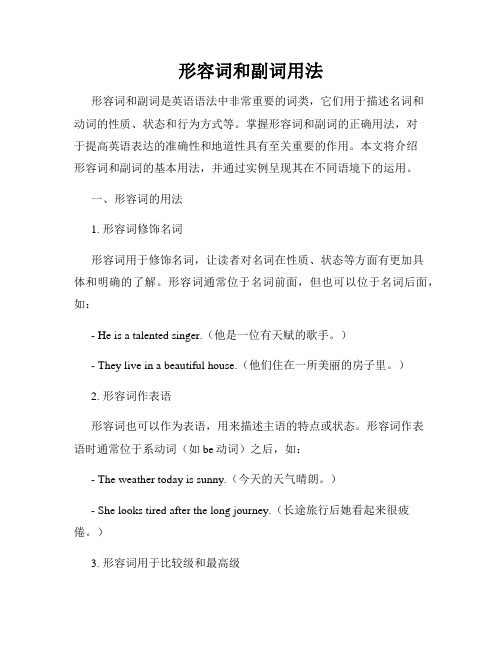
形容词和副词用法形容词和副词是英语语法中非常重要的词类,它们用于描述名词和动词的性质、状态和行为方式等。
掌握形容词和副词的正确用法,对于提高英语表达的准确性和地道性具有至关重要的作用。
本文将介绍形容词和副词的基本用法,并通过实例呈现其在不同语境下的运用。
一、形容词的用法1. 形容词修饰名词形容词用于修饰名词,让读者对名词在性质、状态等方面有更加具体和明确的了解。
形容词通常位于名词前面,但也可以位于名词后面,如:- He is a talented singer.(他是一位有天赋的歌手。
)- They live in a beautiful house.(他们住在一所美丽的房子里。
)2. 形容词作表语形容词也可以作为表语,用来描述主语的特点或状态。
形容词作表语时通常位于系动词(如be动词)之后,如:- The weather today is sunny.(今天的天气晴朗。
)- She looks tired after the long journey.(长途旅行后她看起来很疲倦。
)3. 形容词用于比较级和最高级形容词在表达比较级和最高级时,可以使用不同的形式。
一般来说,单音节形容词和部分双音节形容词在比较级前加-er,最高级前加-est,如:- The blue car is faster than the red one.(蓝色的汽车比红色的快。
)- She is the tallest girl in the class.(她是班上最高的女孩。
)但也有部分双音节和多音节形容词在前面加more和most来表示比较级和最高级,如:- This novel is more interesting than that one.(这本小说比那本更有趣。
)- It was the most exciting concert I have ever attended.(那是我参加过的最令人兴奋的音乐会。
介绍形容词、副词的基本用法和搭配。

介绍形容词、副词的基本用法和搭配。
形容词是一种用来描述或修饰名词或代词的词。
它们通常用来提供关于事物的特征、性质、状态或质量的信息。
形容词在句子中可以用来作主语、谓语、宾语、定语或表语。
形容词的基本用法:1. 作主语:Happy people are more likely to succeed.(幸福的人更有可能成功。
)2. 作谓语:The food was delicious.(这个食物很美味。
)3. 作宾语:She finds the movie boring.(她觉得这个电影很无聊。
)4. 作定语:The big house is located by the lake.(这座大房子位于湖边。
)5. 作表语(和系动词连用):She is tall.(她个子高。
)副词是一种用来修饰动词、形容词、其他副词或整个句子的词。
它们通常用来表示时间、地点、方式、程度、目的或状态等方面的信息。
副词的基本用法:1. 修饰动词:She sings beautifully.(她唱得很动听。
)2. 修饰形容词:She is extremely talented.(她非常有才华。
)3. 修饰其他副词:He runs very quickly.(他跑得很快。
)4. 修饰整个句子:Fortunately, it didn't rain on our trip.(幸运的是,我们旅行期间没有下雨。
)形容词和副词在搭配上也有一些常见的规则:1. 形容词通常位于名词之前:a beautiful flower(一朵美丽的花)。
2. 形容词一般不可数名词之前用作修饰性物主代词:my new car(我的新车)。
3. 形容词一般不可数名词之后用作表语:The house is expensive.(这栋房子很贵。
)4. 副词通常位于动词之前:She runs quickly.(她跑得很快。
)5. 副词位于形容词之前修饰形容词:a very beautiful garden(一个非常美丽的花园)。
- 1、下载文档前请自行甄别文档内容的完整性,平台不提供额外的编辑、内容补充、找答案等附加服务。
- 2、"仅部分预览"的文档,不可在线预览部分如存在完整性等问题,可反馈申请退款(可完整预览的文档不适用该条件!)。
- 3、如文档侵犯您的权益,请联系客服反馈,我们会尽快为您处理(人工客服工作时间:9:00-18:30)。
1、形容词在句中作定语, 表语, 宾语补足语。
Paris is a beautiful city.(作定语)The fish went bad. (作表语)I feel happy. (作表语)It sounds great.(作表语)We keep our classroom clean and tidy.(作宾语补足语)2、表示情感变化或心理感受方面的及物动词,在后面加上“-ed”或“ -ing”后都可以构成形容词,但这两种不同形式的形容词在用法上有明显的区别。
① interest ed, excite d, bore d, amaze d, surprise d, embarrass ed, frighten ed,please d, terrifi ed, tire d等一般用在“人”作主语时,他们跟在be动词或系动词后作表语,表示所修饰、陈述的人能体会到某种感觉,译为“对......感到......”The girl is __________(terrify) of being alone at home.I’m _________ (please) with the football match. We did quite well this time.The boy felt so ___________to hear the ___________ news. (excite)② interest ing, excit ing, bor ing, amaz ing, surpris ing, tir ing, mov ing, thrill ing, embarrass ing等一般用在“物”作主语时,他们跟在be动词或系动词后作表语;另外他们也可以放在表示物的形容词前作定语,表示所修饰、陈述的物能令人有某种感觉,译为“令人(感到)......的”。
The football match is very _____________ (interest).Our English teacher can always make her lessons ____________ (interest).The girl said that she had never seen such a ____________ (bore) movie.Some of the jokes that they played on each other were ______(embarrass).③常见带有-ed, -ing的形容词的变化形式及其固定短语搭配。
及物动词ed形式及常见短语ing形式excite(使兴奋,使激动)be excited about excitingsurprise(使惊讶,使吃惊)be surprised at surprising及物动词ed形式及常见短语ing形式amaze(使吃惊)be amazed at amazingembarrass(使尴尬)be embarrassed in embarrassingencourage(使受鼓舞,鼓励) be encouraged at/by encouragingfrustrate(使失望,使沮丧)be frustrated of frustratinginterest(使感兴趣)be interested in interestingthrill(使激动/ 紧张)be thrilled at thrillingterrify(使恐怖,使害怕)be terrified at/of/with terrifyingplease (使高兴,使满意)be pleased with pleasing/pleasantsatisfy (使满意) be satisfied with satisfyingfrighten (使害怕,使惊惧)be frightened at/of frighteningtire(使厌烦)be tired of tiringbore(使厌烦)be bored with boringrelax(使放松)relaxed (无固定搭配) relaxingfascinate(使着迷)be fascinated by fascinatingannoy(使烦恼)be annoyed with annoyingmove(使感动)be moved by movingworry(使担忧)be worried about worryingconfuse(使糊涂,使困惑)be confused about confusingdepress(使沮丧)depressed(无精打采的)depressing沮丧的3、有一些词再加上以下后缀后,多表示形容词:-able/ible, -al/ical, -ful, -less,-ous, -tive/sive, -y, -en, -ern等。
① -able/ibleknowledge___ 有丰富知识的comfort___ 舒服的enjoy___ 愉快的suit___ 合适的;适宜的drink___ 可以喝的reason___ 合理的print___ 可印刷的poss___/imposs___可能的/不可能的terr___可怕的② -al/icalusu__ 通常的person__私人的internation__ 国际的education__ 教育的mus___ 音乐的techn___ 技术的histor___ 史学的med___医学的③ -fulcare___小心的;仔细的help___有帮助的use___有用的hope___有希望的thank___ 感谢的1 wonder___ 极好的;精彩的success___ 成功的power___ 强大的pain___ 痛苦的peace___ 和平的④–lesscare___ 粗心的help___ 没有帮助的use___ 无用的hope___ 没有希望的home___ 无家可归的price___ 无价的end___ 无止境的job___ 失业的sleep___ 失眠的wire___ 无线的⑤ -ousfam___ 著名的danger___ 危险的anxi___ 焦急的nerv___紧张不安的seri___ 严肃的humor___ 幽默的preci___ 宝贵的;珍贵的⑥–tive/siveac___积极的crea___有创造力的attrac___有吸引力的sensi___敏感的expen___ 昂贵的⑦ -ysunn__晴朗的wind__刮风的cloud__多云的rain__下雨的snow__下雪的sleep__想睡觉的hair__多毛的milk__牛奶的;乳状的;乳白色的spic__辛辣的⑧ -enwood__ 木制的gold__ 金色的wool__ 羊毛质的⑨ -erneast___ 东方的south___ 南方的west___ 西方的north___ 北方的4、有一些词是以ly结尾,但是他们不是副词而是形容词①表示时间的加ly的形容词;dai ly每天的week ly每周的month ly每月的year ly每年的②表示人的加ly的形容词;man ly男子气的woman ly女人气的③表示人的外貌、特征、性格、心理的加ly的形容词。
friend ly有好的love ly可爱的;令人愉快的live ly活波的;生动的;真实的lone ly寂寞的;孤单的5、合成形容词。
warm-hearted热心的bad-tempered坏脾气的left-handed左撇子的man-made人造的hand-made手工的second-hand二手的;旧的hard-working勤劳的;勤奋的cold-blooded冷血的100-meter一百米的two-year-old两岁的part-time业余的full-time专职的;全日制的1、副词在句中可作状语,表语和定语。
He studies very hard. (作状语)Life here is full of joy. (作定语)When will you be back? (作表语)副词是表示行为特征, 动作方式以及性质特征等方面的一类词。
如slowly, well,too, carefully, quite等。
副词可以修饰动词,形容词,其他的副词以及表示时间、地点、程度等概念。
2、形容词变换成副词的方式。
①一般形容词加上后缀“ ly ” 转变成副词。
useful-__________ main-__________ strong-_________②一般“辅音字母+ y”结尾的形容词,去掉y变为“ ily”。
noisy-___________ lucky-__________ heavy-__________happy-__________ easy-__________③一般以le结尾的形容词,去“e” 变成“y”。
terrible-__________ probable-_________ comfortable-_________④以“辅音字母+ e”结尾的形容词,直接+ ly。
wide-__________ fortunate-__________以“元音字母+ e”结尾的形容词,要去掉e再加ly。
true-__________ 真实地;真诚地3、方式副词一般都是回答“怎样的?” 这类问题的,常见的方式副词有:brave ly,calm ly, careful ly, proud ly, happi ly, rapid ly, wide ly,slow ly, warm ly, angri ly, sudden ly, successful ly, well, fast, slow, quick, hard,alone, high, straight等。
* The old man walked home slowly.* Please listen to the teacher carefully.* The birds are flying high.* He runs very fast.2三、完成以下练习。
用形容词和副词的适当形式填空。
1. Judy is a ________ worker. She works ________. (slow)2. Paul is a ________ driver. He drives his car ________. (careful)3. The test was very ________. I solved it ________. (easy)4. The answer was ______. She answered all the questions _______.(correct)5. They are very ________. They live _________. (happy)6. He made a __________ move. He stopped __________. (sudden)7. Sam is a ________ person. He always speaks _________. (quiet)8. David is an ________ person. He behaves _________. (honest)9. The children played _________. The children were ________. (noise)10. She studies ________ (hard). Her schoolwork is very ________ (well).11. It was a ________ rain. It also rained _________ yesterday. (heavy)12. His handwriting is very _________. He writes very _________. (clear)13. Nadia dances __________. She is also a __________ dancer. (beautiful)14. They gave a ________ reply. They replied ________. (rude)15. She types ________. Her typing speed is ________. (fast)16. My sister’s English is _______. Can you speak English ________? (fluent)17. Mrs. White shouted at the boys ______. She was very _______. (angry)18. He buys ___________ things. He lives very ___________. (expensive)19. “The weather is __________ (wonderful).” He said _________ (loud).20. Are you __________ in basketball? (interest)21. I enjoyed the football match. It was quite _________. (excite)22. The house hadn´t been cleaned for ages. It was really ___________. (disgust). I can’t stand it anymore.23. It was a really ___________ experience. (terrify)24. I will be very __________ if he does well in his test. (surprise)25. Did you hear the __________news about the accident? (shock)26. Do you easily get __________? (embarrass)27. I was not ___________ to be kept waiting so long. (amuse)28. These instructions are extremely __________. (confuse)29. It was very ___________ that he couldn’t go hiking with us. (disappoint).30. The wet weather is so __________. I feel really __________ (depress)31. She´s such a ________ girl. She never wants to go out with us. That makes us really ________(boring).32. I´m a little __________. I thought your birthday was next Wednesday. (confuse)33. Don´t be too __________. Everything will be OK. (depress)34. Have you heard the _________ news about Ann? She won first prize in the cooking competition lastweek. (surprise)四、从A,B,C,D四个选项中选出正确的答案。
